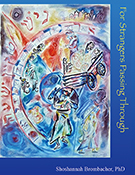The stories illustrate the complex and different paths that Rebbes and their Chassidim chose to live, survive, and solve their problems. They were selected because they are sweet, meaningful, or to the point.
This book contains a collection of Chassidic mayses (stories or anecdotes) and parables from the eighteenth and nineteenth century. They were selected because they are sweet, meaningful, or to the point. The stories illustrate the complex and different paths that Rebbes and their Chassidim chose to live, survive, and solve their problems. Their goal was to redeem the Divine sparks which are hidden in all the nooks and crannies of the Galut (Exile), just as the Jewish people are dispersed everywhere in the world. Chassidic Rebbes all serve HaShem, G'd, in their own, unique way. Rabbi Chaim of Sanz stated, that the Chassid who insists that only his own Rebbe is right will forfeit this world and the World to Come. Some Rebbes promoted a path of study, others one of fasting, or joy and dancing, or prayer. In this book, they are all united through the path of art, because each story is complemented with an image that captures its essence and atmosphere. My own path started long ago in my father's study, in Holland, with art books and Martin Buber's collection of Chassidic stories. I heard many of the stories presented in this book at Shabbat tables. It was not always easy to find their (written) source(s). The people who told them don't always remember those. Some anecdotes are told in different versions or are ascribed to different Rebbes. Others change a bit-or a lot-over the course of several Shabbat meals. But to those who exclaim. "This is not the right version," I would recommend the story of The Old Harp in this book, which, I hope, will inspire my readers, the "strangers passing through," to embellish their Shabbat meals and other occasions with the words and wisdom of the Chassidic Masters. The title of the book refers to an anecdote about Rabbi Naftali of Ropshitz's visit to a small village with an even smaller graveyard. The living-and lively-heritage of the Chassidic Masters will help us to avoid the spiritual graveyard. Rabbi Menachem Mendel of Rymanow resented road repairs, because people traveling on new, smooth roads hurried along and had no time to stop and tell stories (see No Peace, No Quiet). Let us interrupt our hectic lives and daily chores on a regular basis to find our own path-with help of the early Chassidic Rebbes. The layout of the text, with blank lines, short sentences, and visual effects, intends to follow the pattern of oral narratives. The illustrations in this book were created over a period of twenty-five years, starting after I moved from Europe to New York. Some were designed specifically with this book in mind, while others were made independently. I consider my art an inseparable part of my Yiddishkayt (expressing one's Jewish nature by adhering to religious and cultural Jewish life). In fact, I started painting before telling stories, both at an early age.
 Updating...
Updating... 
